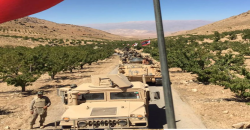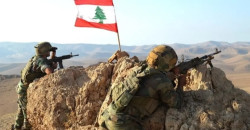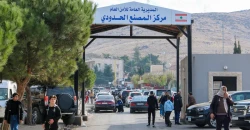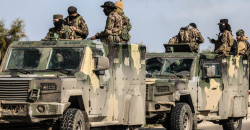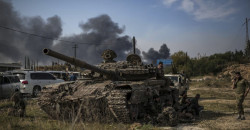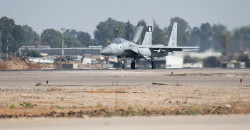Lebanese Army urges caution on Syrian Border reports

Shafaq News – Beirut
The Lebanese Army renewed its call for accuracy in media reporting on border security developments, particularly in sensitive areas along the Lebanese-Syrian frontier.
In a statement on Saturday, the army warned that misinformation and speculation could provoke internal unrest and undermine national stability, urging media outlets to rely solely on official statements for reliable updates.
The military stressed that its coordination with Syrian authorities remains ongoing and that regular security procedures are being implemented to monitor and secure the border. This comes amid growing unease over reported military activity and cross-border tensions.
إلحاقًا بالبيان الصادر بتاريخ ١ / ٧ / ٢٠٢٥ والمتعلق بالتدابير الأمنية للجيش عند الحدود اللبنانية السورية، تعيد قيادة الجيش التشديد على ضرورة توخي الدقة من قبل وسائل الإعلام لدى نشر أخبار تتعلق بالجيش والوضع الأمني، لا سيما في المناطق الحدودية، لما تتركه الشائعات والأخبار غير… pic.twitter.com/9APQs2ZReq
— الجيش اللبناني (@LebarmyOfficial) July 5, 2025
In recent weeks, Lebanese and regional observers have noted an increase in Syrian military deployments opposite key Lebanese border areas such as Rachaya, Al-Qaa, and Al-Qasr. Of particular concern is the presence of foreign fighters operating openly near the border, according to Lebanese security sources.
These movements have raised fears of potential infiltration into Lebanese territory, particularly through northern areas where some local groups are seen as sympathetic to the new Syrian government but hostile to Hezbollah.
Lebanese sources believe that such actors—many of whom hold longstanding grievances from past conflicts—may be seeking retaliation against Hezbollah, which played a significant combat role in the Syrian civil war.
Media outlets said that Hezbollah has reportedly repositioned fighters from southern Lebanon to the eastern border in coordination with the Lebanese Army, which continues to struggle with controlling smuggling and infiltration across the 375-kilometer-long border. However, the group did not comment on these reports.
Syria, for its part, maintains that its increased presence along the border is aimed at curbing the smuggling of weapons and narcotics—issues that Damascus frequently attributes to Hezbollah-linked networks.
These latest developments revive long-standing tensions surrounding the Lebanese-Syrian border, an area historically marked by disputes, ambiguous demarcations, and illicit crossings. Despite the signing of a preliminary border coordination agreement between the two countries in Jeddah last March—following deadly border clashes—implementation has remained limited. The agreement envisioned joint legal and technical committees to address security threats and explore eventual demarcation.
In parallel, political discussions have been in place. US envoy Thomas Barrack recently presented Lebanese officials with a multi-point proposal, urging improved security coordination with Syria, the formal demarcation of borders, and the restriction of weapons to official state forces.
The Lebanese government has yet to announce its formal position.
Prime Minister Nawaf Salam has signaled Beirut's intent to extend state authority across all national territory and to regulate the border through joint efforts with Damascus.
The issue of border control has also featured in recent meetings between Salam and Syrian President Ahmad Al-Sharaa. However, no official timeline has been announced for implementing the coordination measures.
